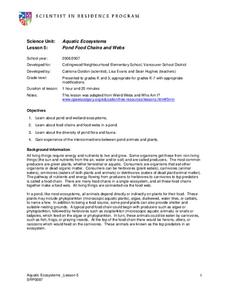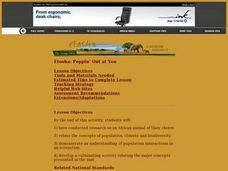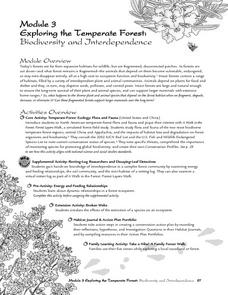Curated OER
Biodiversity
Fifth graders visit the playground to look for signs of life. They search for insects, birds, animal tracks, feathers, nests, trees, soil, etc. They then compose a class list that shows all findings in the schoolyard and post it in the...
Curated OER
Study of Animals
Third graders use the internet to research about an animal. After watching a demonstration, they follow the same steps to gain access to the internet as their teacher and find a picture of their animal to print. They complete a worksheet...
Japan Society
Our Family and Other Families: Using Totoro to Teach Family Structure
What do families around the world have in common? Explore this theme through the popular animated film My Neighbor Totoro by Hayao Miyazaki. Over the course of two days, pupils view the film, pausing to discuss their own families and the...
Curated OER
Creating a Pollinator Garden
Young scholars build a pollination garden. In this pollination activity, students read directions and build a pollinator garden that will produce flowering plants for pollinator organisms to use in pollination of other plants.
Curated OER
Biodiversity in an Estuary
Students investigate the biodiversity in estuaries. In this estuary lesson plan, students use Google Earth to explore the Rookery Bay National Estuarine Research Reserve. They produce a biodiversity concept map and portray the life of a...
Curated OER
Wildlife Conservation III
Discuss the importance of wildlife conservation. Learners talk about the animals and plants on the US Fish and Wildlife Services list of endangered and threatened species. Then, they engage in a detailed discussion of the reasons these...
Curated OER
Aquatic Ecosystems
Students study ponds and wetland ecosystems and examine the food chains and webs in them. In this aquatic ecosystems lesson plan students answer questions about the diversity of the flora and fauna in a pond.
Curated OER
Invertebrate Classification
High schoolers discuss the recent disovery of the "furry lobster" to peak interest in the animal kingdom. They classify various speciments using invertebrate dichotomous keys, identifying major animal phyla and classes. Thy the complete...
Curated OER
Insects!
Students explore the diet of insects. In this "insects" biology lesson, students take a nature walk and collect various natural materials they think may be eaten by insects. Students sort and classify these materials into three diet...
Curated OER
Classroom Quilt of Cultures
Students discuss the similarities and differences in their cultural traditions. In this quilt of cultures lesson, students sing and dance to "Smile at your Neighbor." Students write down their favorite food, holiday, family activity,...
Curated OER
Stem Cells: 5 Year Progress Report
Students explore different aspects of stem cells. In this human biology lesson plan, students complete numerous activities including reading an article and discussing it, watching a video on stem cells reproducing over time, and...
Curated OER
Cycles of Life in an Urban Habitat: Changes in Biodiversity
Second graders compare and contrast animate and inanimate objects. For this environmental science lesson, 2nd graders create simple food webs. They observe their environment and create a collage about it.
Curated OER
Curious Crossbreeds
Students discover the diverse roles of hybridization among animals. They research certain examples of animal hybrids as a springboard to analyzing a zoo's potential exhibit of animal hybrids.
Curated OER
Etosha: Poppin' Out at You
Tenth graders research an African animal of their choice and relate the concepts of population, climate and biodiversity to their animal. They examine how population interacts in an ecosystem.
Curated OER
Gel Electrophoresis: Sort and See the DNA
Students construct DNA fingerprints. In this genetics instructional activity, students watch an on-line gel electrophoresis animation, then they work in groups to use a restriction map to create a restriction enzyme and use that to...
Curated OER
Ecosystem Interactions in Refuges
Seventh graders, using national parks as models, illustrate the energy flow in ecosystems. Working in groups, they use murals, flow charts, or other visual displays to record their findings. Students represent the food chains and webs...
Curated OER
No Bones About It
Students act as paleontologists, examining pictures of dinosaur skeletons and applying their knowledge of the relationship between skeletal features and survival, to create 'Paleontology Reports' about their perceptions of the lives of...
Curated OER
Exploring the Temperate Forest: Biodiversity and Interdependence
Students examine the consequences of cutting down large amounts of forests throughout the world. In groups, they use the internet to complete a module taking them on a tour through different temperate forests. To end the lesson, they...
Curated OER
Explore Your Natural Habitat
Students identify habitats and understand why they are important to our environment. In this environmental lesson students design their own habitat, observe and record data on the impact their habitat has on the environment.
Curated OER
Deforestation, Fragmentation, and the Edge Effect
Students participate in an activity to demonstrate how deforestation, fragmentation, and habitat edges may affect native animal populations. Students accomplish this by playing a game from a provided worksheet and completing a graphing...
Curated OER
Management of Wildlife Resources
Students investigate how wildlife management policies affect the size of large animal populations. They develop a spreadsheet that incorporates a mathematical model to predict big game herd sizes, and using worksheet data manage a bison...
Curated OER
Dibble Pond Ecosystem
Students collect specimen and analyze it. In this biology activity, students analyze and evaluate the diversity found in specific environment. They use the correct terminology as they do their write up for the experiment.
Curated OER
How Many Birds Would It Take To Keep A Jackal Alive?
Students examine the role of large families in some animal populations. They work together to complete an activity related to food supply. They discover the relationship between preys and predators.
Curated OER
The Big Hideout
Learners identify the types of camouflage used by animals in the desert. They work together to create their own animal creating their own type of camouflage. They determine how well the camouflage works.

























